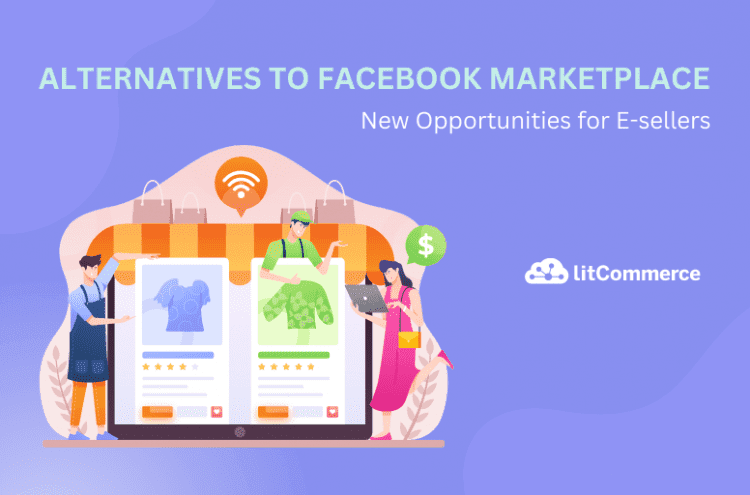Facebook Marketplace has been a go-to platform for buying and selling products since its launch in 2016. However, with the increasing concerns around data privacy and limited features, many users are now looking for a new Facebook Marketplace alternative.
In this article, we explore the top 8 alternatives to Facebook Marketplace and explain more of the reasons why people may be seeking these alternative platforms:
Whether you are looking for a new platform with a wider reach, better privacy practices, or more specialized features, several great alternatives are available.
Let’s dive right in and check out the top Facebook Marketplace alternatives!
Grow your multichannel business with LitCommerce
|
Facebook Marketplace Alternative: What to Know?
Facebook Marketplace has dominated local buying and selling for years, but its limitations have spurred the growth of compelling alternatives. Before exploring the best alternatives to Facebook Marketplace, let’s walk through the basics of Facebook Marketplace and learn why sellers find other platforms to run their online businesses.
What is Facebook Marketplace?
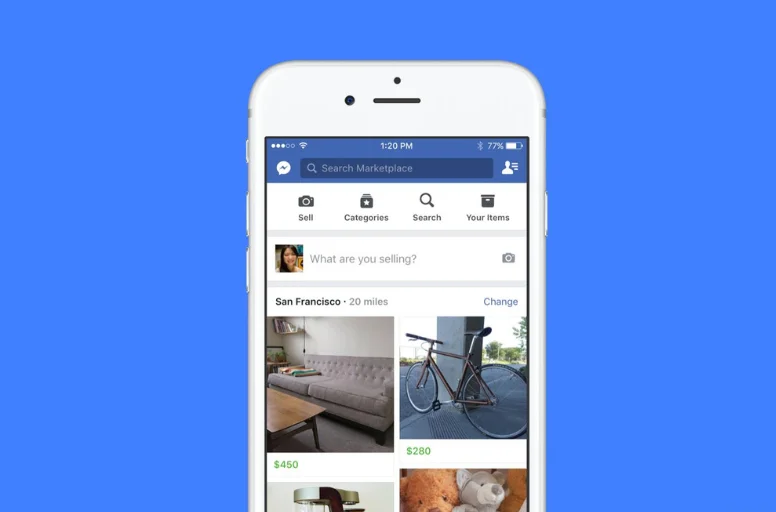
Facebook Marketplace is an online platform that allows users to buy and sell goods and services. Many sellers start selling on Facebook Marketplace thanks to its convenience and free of charge. It is integrated with Facebook Messenger, which enables buyers and sellers to chat with each other, negotiate prices, and arrange for pickup or delivery.
Furthermore, Facebook Marketplace has a national and local reach so that users can easily find items within their local area. This platform offers a wide range of products, making it suitable for various users. The best-selling items on Facebook Marketplace are often furniture, fashion apparel, and books.
You may have heard of Facebook Shop and wonder what the differences between Facebook Shop vs Marketplace are. Simply put, Facebook Marketplace is where individuals can trade items within their community. At the same time, online merchants can also sell their products directly on their Facebook pages by learning how to start an online boutique on Facebook.
Wanna check out more the in-depth Facebook Marketplace reviews? Read more here.
Why do people look for Facebook Marketplace alternatives?
Despite its popularity, more and more sellers find alternatives to Facebook Marketplace for selling goods. The main reasons for that are:
- Complex interface: Facebook’s broad social network interface can make Marketplace feel disjointed and hard to navigate for those interested in buying goods. The interface is not explicitly tailored to commerce, and countless unrelated posts clutter the feed, making search pointless. You’ll get random “likes” but few real leads or sales. Serious buyers know to look elsewhere for well-presented, categorized goods. They want professionalism, not what amounts to social media chaos.
- No management features: Important logistics like payments, shipping, and returns are your problem alone. Facebook provides no tools to actually manage commitments and complete transactions with buyers.
- Converting concern: Reaches may seem large, but little converts to paying customers. While Facebook Marketplace exposes listings to many casual browsers, most are not actively looking to buy used goods. They browse but do not actually purchase. You need a targeted approach to reach real buyers through ads or other means. The general audience on Facebook Marketplace will not cover your costs or time spent.
- Limited promotion and discoverability options: Sellers also grow frustrated with Facebook Marketplace’s limited options for promotion. Hence, it isn’t easy to boost visibility for listings.
- High fees: Is Facebook Marketplace free to use? Yes, but Facebook charges advertising fees that indirectly impact the costs. Running ads on Facebook Marketplace can be difficult. It can be challenging to reach a targeted audience. Ad targeting options may not be as precise as other platforms. This could result in increased costs and lower conversion rates.
Top Alternatives to Facebook Marketplace You Shouldn’t Miss
Without a doubt, due to the listed cons for using Facebook Marketplace, many sellers are seeking other places like Facebook Marketplace to run their business. But what is the next ideal choice for them?
Wait no further! Below are the best alternatives to Facebook Marketplace that offer unique features and a diverse range of products.
#1. Craigslist
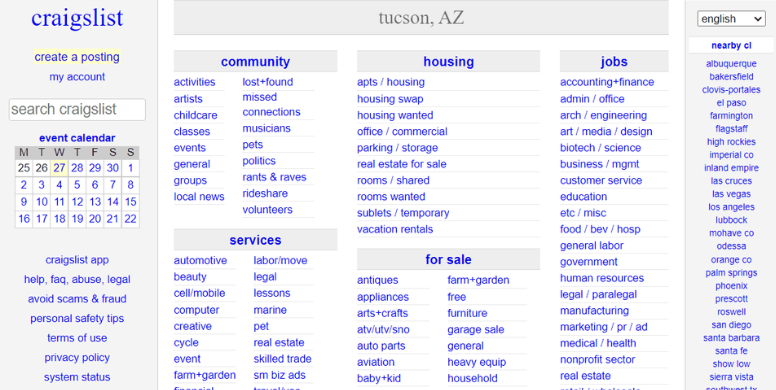
Craigslist is one of the sites like Facebook marketplace, where users can trade goods and services. It has been around since 1995 and remains a popular selling platform for online shopping. Craigslist offers a wide range of categories for sellers to run businesses, making it a great alternative to Facebook Marketplace. Let’s compare Facebook Marketplace vs Craigslist to know why you should choose this platform:
- Worldwide reach: Craigslist Marketplace operates globally in hundreds of cities and regions worldwide. Facebook Marketplace is mainly limited to areas where Facebook has a strong user base.
- Fewer distractions: Craigslist focuses solely on classifieds, listings, and marketplace activities. It has a very minimal, clean interface, which can make listings easier to browse and engage with on Craigslist. Facebook Marketplace has to compete with a lot of other content and distraction from friends’ posts, likes, comments, and more.
- Information Security: The cash-only nature of Craigslist provides more anonymity since no personal information is exchanged. Facebook Marketplace still maintains a level of anonymity, but as part of the Facebook network, some information may be visible regarding the users and activity. That can lead to the risk of fraud or being taken advantage of.
#2. OfferUp
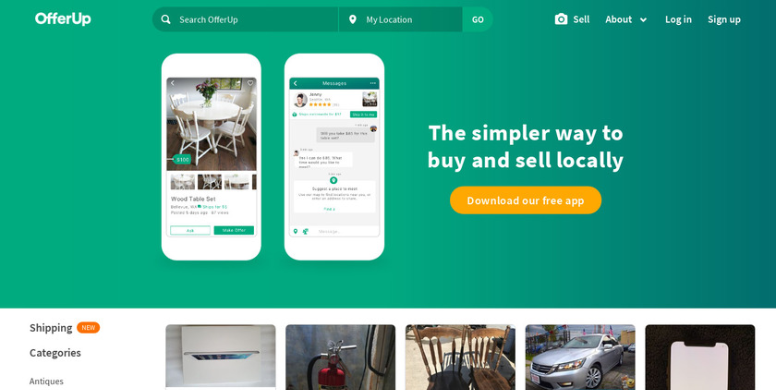
OfferUp is one of the well-known apps like Facebook Marketplace that allows users to buy and sell goods locally. The app was founded in 2011 and has since become a popular alternative to Facebook Marketplace app. Recently, it even expanded further after acquiring LetGo – a local online shopping platform. But that’s not the only reason for you to choose OfferUp. Below are other benefits you can consider:
- Search Optimization: Similar to Facebook Marketplace, OfferUp’s listings highlight what genuinely matters for buyers: photos, details, and price. However, in OfferUp, search is driven by category, keyword, and attribute, so potential buyers can readily reach you. Meanwhile, Facebook Marketplace obscures these important points with a social feed, making inventory harder to find and evaluate. Relevant audiences can’t access your goods as a result.
- Safety: OfferUp surpasses Facebook Marketplace when it comes to safety standards. Specifically, it provides pre-approved meeting spots that are deemed secure, such as bustling public spaces or parking lots located adjacent to police stations. Additionally, OfferUp employs a profile badge program that assists in verifying the identities of individuals and determining their credibility as either a buyer or a seller.
- Rating system: Unlike Facebook Marketplace, OfferUp has a rating system that allows users to rate their experiences with buyers and sellers. That helps to build trust and accountability within the community.
#3. Poshmark
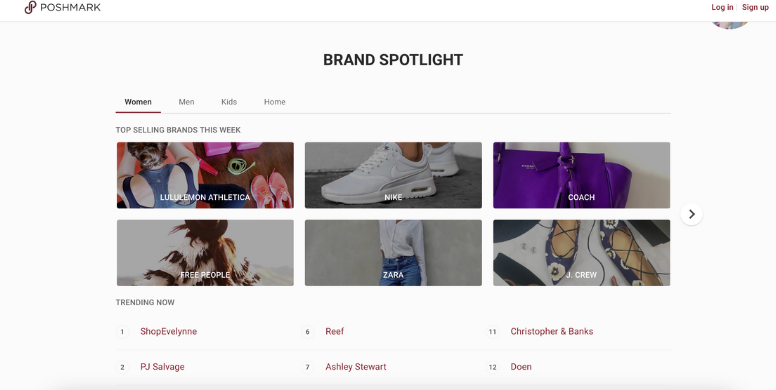
Poshmark is the next platform on our list of best alternatives to Facebook Marketplace. It allows users to buy and sell new or used clothing, accessories, and beauty products, mostly aimed at women. If you want a more specialized shopping experience, this marketplace can be a way to go. Let’s compare Poshmark vs Facebook Marketplace to learn why Poshmark is a great alternative:
- Focus on fashion and style: Poshmark specializes in new or used items for females. Meanwhile, Facebook Marketplace has a much broader range of categories. Therefore, Poshmark is ideal for those specifically looking to sell fashion and lifestyle items that are new or used.
- Shipping with ease: Poshmark simplifies the shipping process by providing the seller with a prepaid and pre-addressed shipping label. The seller only needs to pack the item properly and drop it off at the post office. That helps eliminate the need for additional shipping arrangements or expenses.
- Seller support: Poshmark provides superior service and support for sellers. They have a dedicated team to help you at every step, from account set-up to answering questions to resolving any issues. You have access to resources and educational materials and can speak to an account manager anytime. Facebook offers minimal seller support by comparison.
#4. eBay
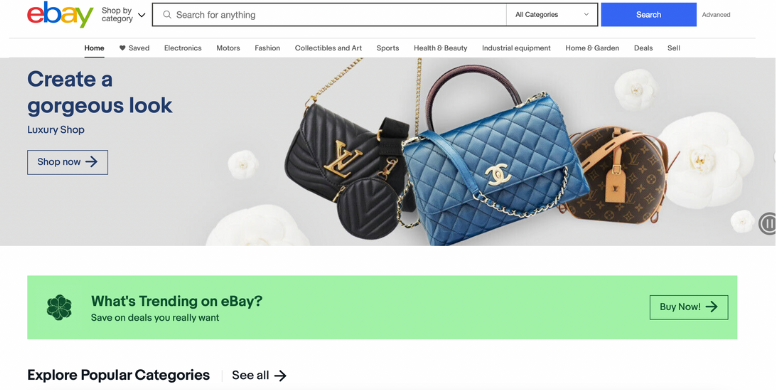
You have probably heard of eBay at least one time in your life. It is the first and foremost platform for selling goods online, having been in operation since 1995. eBay is a highly successful platform with a presence in 190 markets worldwide and over 142 million buyers. This implies that there are numerous benefits to selling on eBay vs Facebook Marketplace:
- Reach and audience: eBay welcomes over 183 million monthly active buyers, many of whom are seriously looking for rare, collectible, or hard-to-find items. Facebook Marketplace has a much smaller, more general audience making listings easy to miss. Therefore, when selling on eBay, online merchants have a high chance to sell their goods.
- Listing tools and optimization: On eBay, sophisticated tools allow you to create professional listings with high-quality images, item specifics, product descriptions, pricing tiers, promotions, and more. Facebook Marketplace offers minimal options for enhancing or promoting your listings.
- Support and resources: eBay offers dedicated support through telephone, email, chat, and an account manager for any issues you face. Support on Facebook is limited. You mostly rely on generic help articles if problems arise.
#5. Etsy
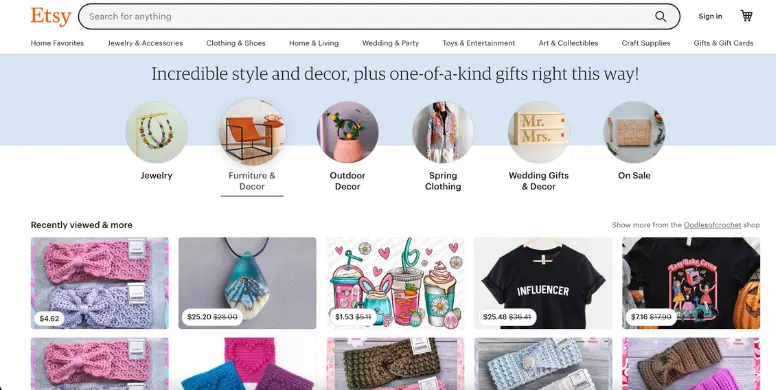
If your business specializes in handmade, vintage, and unique goods, you can start selling on Etsy. It was founded in 2005 and has since become one of the popular alternatives to Facebook Marketplace for those looking for one-of-a-kind items. You might wonder: “Is selling on Etsy worth it?” Let’s compare Etsy vs Facebook Marketplace to figure it out!
- Targeted audience: If general products can not give you sales on Facebook Marketplace, aiming using Etsy. Etsy is a dedicated platform for handmade and vintage items, making it easier to reach a targeted audience of buyers who are specifically interested in those products.
- Good diversity: While Facebook Marketplace is limited to physical goods, Etsy also allows sellers to list digital goods, such as gift cards or crochet patterns. This means that sellers have more opportunities to reach buyers and sell their products.
- Useful listing tools: Etsy offers a more robust set of tools and features than Facebook Marketplaces. For example, Etsy allows you to create a customized storefront, manage your inventory, and use automated listing tools. These features make it easier to manage shops and promote your listings in comparison with Facebook Marketplaces.
- Global reach: Etsy has a worldwide audience of buyers, giving you access to international sales. Facebook Marketplace is localized to your general region or city.
#6. Amazon Marketplace
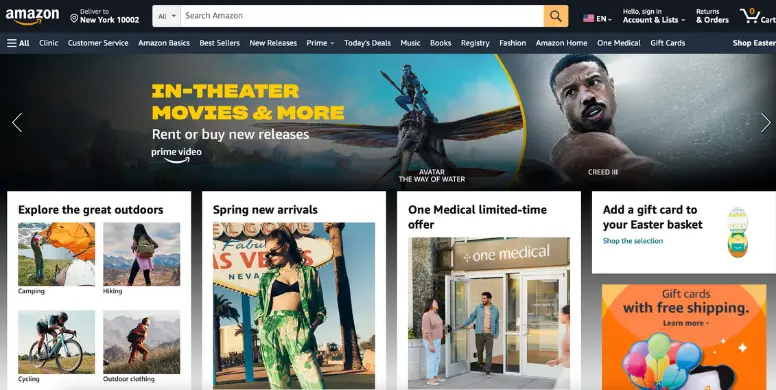
As the world’s leading eCommerce firm, it’s predictable to find Amazon Marketplace listed among the top marketplaces for selling products globally. According to its financial figures, Amazon generated $127.1 billion in revenue during Q.3 of 2022, resulting in a 15% surge compared to 2021. This online marketplace is thriving to become one of the big Facebook Marketplace competitors on the market, and more eCommerce sellers are trying to learn how to sell on Amazon.
- Huge customer base: Amazon Marketplace exposes products to over 300 million monthly active shoppers worldwide. That helps sellers drive more sales on the Marketplace. Meanwhile, Facebook Marketplace reaches a tiny fraction with little relevance or brand loyalty.
- High reputation: Amazon Marketplace has a trusted reputation as a secure and reliable online marketplace. This Marketplace has been around since 1994 and has built a strong reputation for buyer and seller protection. This means buyers are more likely to trust Amazon sellers and feel confident making purchases on the platform than on Facebook Marketplace.
- Strong searchability: Amazon Marketplace has one of the most advanced search engines, optimized to surface even very niche products to interested buyers. Listings on Facebook Marketplace have limited search functionality in comparison.
- Deepest support: Amazon Marketplace provides 24/7 phone support, email support, seller forums, educational resources, and dedicated account managers for any issues you face scaling operations or optimizing performance. Facebook Marketplace offers limited basic support.
When comparing Amazon Marketplace vs Facebook Marketplace, it’s important to distinguish between Amazon vs Amazon Marketplace. While Amazon is a well-known online retailer, Amazon Marketplace is a platform that allows third-party sellers to offer products for sale on the Amazon website.
#7. Mercari
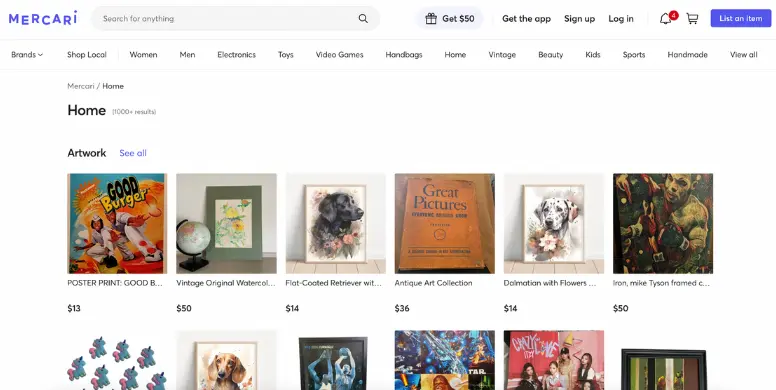
Mercari is a popular online store with a large US, UK, and Japan user base, allowing people to sell or buy items easily. With millions of items listed and 350,000 new items added daily, Mercari is the best candidate for your list of alternatives to Facebook marketplace.
- Integrated Experience: Mercari provides an easy-to-use interface explicitly tailored for buying and selling goods. Facebook Marketplace has a more complex social network interface, requiring additional filters to attract shoppers on local listings.
- Transaction support: Mercari handles the entire transaction process, including invoicing, payments, shipping labels, tracking, and protection from fraud or issues. No need for out-of-pocket costs or dealing with logistics. In contrast, Facebook Marketplace does not provide any tooling or offer support for facilitating actual sales.
#8. Nextdoor
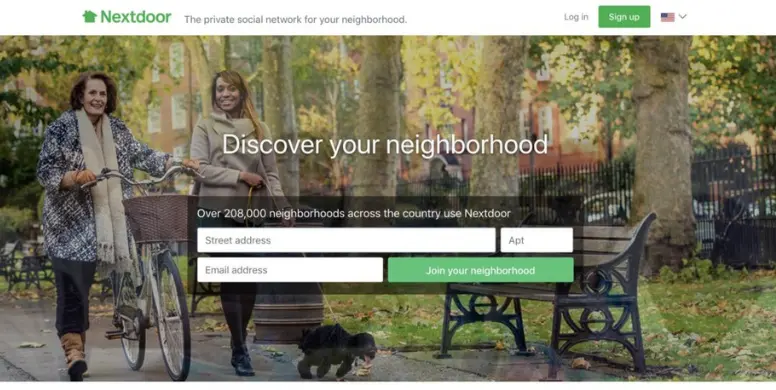
If you search for some places like Facebook Marketplace, which focuses on local business, Nextdoor is a way to go. This social networking platform allows users to connect with people in their local community on a smaller scale. Compared to Facebook Marketplace, there are some points for sellers to consider Nextdoor:
- Hyper-local reach: Nextdoor is designed specifically for local communities, which benefits small businesses or independent sellers who are looking to build a local following. This is because Nextdoor is based on neighborhoods and can help you connect with people who live close to you. Facebook Marketplace also has a localized reach, but still too general compared to Nextdoor.
- Effective advertising: Nextdoor offers a more targeted advertising experience. Sellers can create ads that are only shown to users in their local area. That ensures their advertising budget is spent on reaching potential customers who are most likely to make a purchase. Facebook Marketplace also offers location-targeting ads but is less targeted and not effective in reaching local customers.
Tired of Facebook Marketplace limitations? Explore a wider world of opportunities with LitCommerce. Sell on popular marketplaces like Amazon, eBay, Etsy, and more, all from one centralized platform (Shopify/Wix/BigCommerce/WooCommerce/Square/Squarespace. Manage listings, track inventory, and gain valuable insights to boost your sales across different channels.
Facebook Marketplace Alternatives: FAQs
- 1. What can I use instead of Facebook Marketplace?
If you’re looking for alternatives to Facebook Marketplace, there are plenty of other options to consider; some worth mentioning are:
- Craigslist: A popular online platform for buying and selling goods and services locally.
- OfferUp: A mobile app that lets people buy and sell used items with a focus on safety and security.
- Poshmark: An online marketplace for buying and selling secondhand clothing and accessories.
- eBay: An online marketplace where people buy and sell a vast range of products.
- Etsy: A platform for buying and selling handmade, craft supplies and digital products.
- Amazon Marketplace: The largest eCommerce Platform for third-party sellers to sell their products directly to Amazon customers.
- Mercari: The best platform to sell used items that are useful and convenient.
- Nextdoor: A social network platform where users can buy and sell items among their neighbors.
- 2. Can you be on Marketplace without being on Facebook?
Unfortunately, accessing Facebook Marketplace without being on Facebook is impossible. Facebook Marketplace is a feature that is exclusively available to Facebook users. To use Marketplace, you must have a Facebook account, which must be in good standing with Facebook’s policies and guidelines.
- 3. Where can I sell stuff online fast?
If you’re looking to sell items quickly online, there are a variety of platforms to choose from.
- Craigslist and Nextdoor allow local selling, with listings typically updating immediately after posting.
- Both OfferUp and Mercari update in real-time, allowing buyers to see the most recent items posted.
- Poshmark and eBay can take a few minutes to update listings.
- Etsy and Amazon Marketplace can take a few hours.
It’s vital to provide accurate information and be responsive to potential buyers, regardless of your chosen platform. You can successfully sell your items online and make some extra cash with a little effort.
- 4. Is Craigslist better than Facebook Marketplace?
Craigslist vs Facebook Marketplace, which is better? It depends on what you seek.
Craigslist has been around longer than Facebook Marketplace and has a more established user base. It is a more traditional classifieds site that allows you to sell items to people in your local area.
On the other hand, Facebook Marketplace is integrated with Facebook, which means that buyers and sellers can see each other’s profiles. This can create a sense of trust and security when making transactions with strangers. Ultimately, the best platform for you will depend on your preferences and needs.
Final Words
In short, while Facebook Marketplace may be the most well-known, you can still consider other options that may better suit your needs. Several online apps or websites like Facebook Marketplace are available for those looking to sell items.
Whether you are looking for a localized platform, there is something out there for everyone. By exploring these alternatives to Facebook Marketplace, you can find a place that better aligns with your goals and preferences, ultimately leading to more successful and satisfying transactions. Visit our Blog for more articles that are helpful for e-sellers to thrive in the constantly changing eCommerce industry. We also have a Facebook community for updates and the latest news. Feel free to reach out to us for any questions. LitCommerce is here to help!
Try LitCommerce and explore all the features you need to manage your listings, orders, and inventory across multiple channels. |

